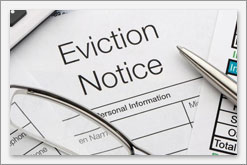 If you are a home owner and a County Court Judgment (CCJ) has been issued against you which you have failed to pay the creditor can apply for a charging order against your property. This is a court order which turns the unsecured debt into a debt secured against your home. If a charging order is granted this is registered against the property. If you then decide to sell the charging order will be paid out of any equity before you receive any remaining proceeds. However if a charging order is issued can you be forced to sell against your will?
If you are a home owner and a County Court Judgment (CCJ) has been issued against you which you have failed to pay the creditor can apply for a charging order against your property. This is a court order which turns the unsecured debt into a debt secured against your home. If a charging order is granted this is registered against the property. If you then decide to sell the charging order will be paid out of any equity before you receive any remaining proceeds. However if a charging order is issued can you be forced to sell against your will?
The issue of a Charging Order does not mean you can be forced to sell
It is important to understand that a Charging Order is an equitable charge. As such it has no automatic power of sale. This means that once the charge is issued it does not mean that you can then be forced to sell your home by the creditor. The creditor will still have to make do with accepting monthly repayments.
The only way that you can be forced to sell is if the creditor returns to Court and applies for an Order for Sale. This will generally not be granted. The Court will first take into account the size of the debt, the property’s value and whether it is a family home. They will not order a sale if the property is in negative equity. In addition they will not do so if the costs of the sale are likely to exceed the amount of the debt as this remedy would be disproportionate.
BMD Tip: You might be forced to sell a property if it is not being used as your home and is just an investment property. Where this is the case as long as the sale would generate sufficient funds to pay the debt in full the order might be granted. However the creditor would normally also have to show that the were making no attempt to repay the debt in another way.
What is the point of a Charging Order if you cannot be forced to sell?
Because of the general reluctance of the Court to agree to an Order of Sale this begs the question as to why any creditor would consider taking out a charging order in the first place? The answer to this is that a charging order provides security for a debt.
Over the past 12 months, the number of formal personal insolvency procedures (IVA and bankruptcy) has significantly increased. In August 09, the insolvency service reported that c33,000 people had undertaken IVAs or Bankruptcy between April – June 2009, a 27% increase on the same quarter in 2008. Where these procedures take place, any unsecured creditors run the risk of receiving a vastly reduced amount of their debt or nothing at all.
Therefore, although a charging order gives no immediate prospect of the creditor receiving payment of their debt, in the event that the debtor is made bankrupt or enters into an IVA, the order ensures that, subject to there being sufficient equity, the creditor will get paid when the property is eventually sold.

